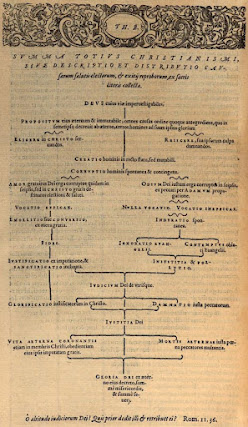The following is that of Theodore Beza’s Tabula (1555) which depicts his understanding of predestination:
Latin:
(source)
English translation:
Source:
Hans Boersma, Violence, Hospitality, and the Cross:
Reappropriating the Atonement Tradition (Grand Rapids, Mich.: Baker
Academic, 2004), 63
One will notice "Ineffectual calling" (Latin: Vocatio Inefficax) in the diagram. Commenting on this, and how it leads to a lack of assurance of salvation in Reformed theology, Hoersma wrote that
The uncertainty and fear of being
on the wrong side of the chart were reinforced by the notion of an “ineffectual
calling,” which Beza connected with temporary faith. Reprobates might have many
signs that would appear to indicate God had called them, too. Yet in realty
this calling was not a true calling. Their love of God’s Word, their desire for
Christian fellowship, and their zeal to do good works might all seem to
indicate the presence of God’s special grace and effectual calling that did not
lead to true conversion and true faith. In due time, this would become evident,
when people with an ineffectual calling would harden their hearts and thereby
show that they had never been inwardly called by the Spirit of God. Their call
had merely been an external one. Those who were truly and inwardly called would
always and necessarily persevere in their faith. This horribly difficult
question now became “how to distinguish a weak but true faith from a strong but
temporary one” (Peter White, Predestination, Policy, and Polemic: Conflict
and Consensus in the English Church from the Reformation to the Civil War [Cambridge:
Cambridge University Press, 1992], 21). As a result of this Bezan approach, a
nagging doubt began to creep among the Reformed communities. (Ibid., 62, 64)

